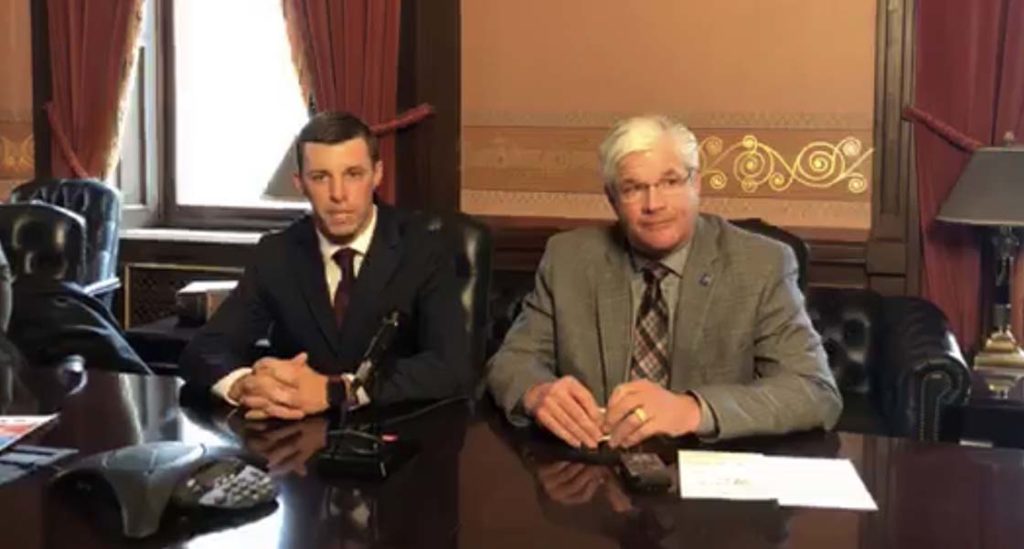Republican leaders respond to Whitmer's State of the State

Speaker of the House Lee Chatfield (left) and Senate Majority Leader Mike Shirkey (right) said Whitmer “missed opportunities” in her Tuesday evening State of the State address — primarily on reforms to state no-fault auto insurance and criminal justice.
by Riley Beggin (Bridge)
Read about Gov. Whitmer's State of the State address HERE.
Smooth roads and free college would be great, Republican leaders in the state legislature say, but they have one message for Democratic Gov. Gretchen Whitmer: Show me the money.
In a Wednesday morning response to Whitmer’s first State of the State address, House Speaker Lee Chatfield and Senate Majority Leader Mike Shirkey agreed with Whitmer that the state’s infrastructure needs more funding. However, they want more specifics on Whitmer’s plan and indicated they’re not ready to increase taxes and fees to pay for it.
“We heard a lot of neat ideas last evening and things that the governor believes should be provided to the citizens of our state. What we didn't hear is how that revenue will be accumulated,” Chatfield said. “Michigan only has the money that we take out of the pockets of the people that we serve.”
Both leaders defended the 2015 legislation that slowly raises funding for roads over years — Whitmer swiped at the money raised by the plan Tuesday night, saying “incremental fund shifts… just won’t fix the problem.”
Before taking action, Shirkey said, the governor and legislature still need to agree on basics such as the true gap between how much has been allocated to road funding and how much is truly needed, the eventual goal and the timeframe.
“Nobody should assume we're going to solve this problem in one fell swoop,” Shirkey said. “It's too big and doing it piecemeal, I think, was the right way to do it.”
Chatfield said it’s clear the roads need more money but that he’d prefer to look for places in the state budget to cut spending to move funding to roads (rather than jump to a fee increase). He did not offer suggestions of places ripe for a trim.
“Before we simply say we're just going to go back to the pockets of our taxpayers and raise revenue without cutting anywhere else, I think that's irresponsible because it's our duty to ensure their money is spent correctly,” Chatfield said.
For state-maintained roads alone, experts say an estimated $1.5 billion more is needed annually through 2031 to bring most roads to good or fair condition.
Another point of division is on the environment. While members of the GOP caucus are contesting Whitmer’s controversial change to the state’s Department of Environmental Quality, Shirkey indicated he wouldn’t yet support the administration’s plans to address PFAS or climate change.
It’s clear PFAS has contaminated drinking water in communities across the state, Shirkey said, but “it is not clear to me that we’ve created a situation where we know what to do with that level. And that's what I mean about we need to increase our wisdom before we make any decisions.”
Shirkey said the state has plenty of data related to PFAS, but he’s not yet sure how the state should tackle the problem.
The U.S. Environmental Protection Agency has not set a federal standard on how much PFAS in drinking water is safe, but several other states facing PFAS crises have set standards of their own. Michigan has no drinking water standard for the chemical, but defers to an EPA advisory, which is significantly higher than a new draft advisory from the U.S. Centers for Disease Control.
As for climate change: “I just find it fascinating that we can sit here in Michigan in the chamber of the house and think that we can control the climate,” Shirkey said.
Finally, Whitmer is likely to face a major hurdle in the legislature with her ambitious plans to reduce the cost of college for young Michiganders: A proposal to guarantee two years of debt-free community college or two years of tuition assistance for those who want to attend four-year universities.
Shirkey said the problem with Michigan’s colleges is not the cost but the “value.” Whitmer’s stated goal to increase the number of state residents with a postsecondary credential to 60 percent in just over a decade is “pretty much meaningless” because it doesn’t focus on training in-demand skills over other areas of study.
Whitmer’s 60 percent goal, she said on Tuesday, includes a proposed program offering industry certification or associate degrees in in-demand skills.
There are plenty of options available to make college affordable already, Shirkey said, offering the example of partnerships between private companies and high school students to provide work experience. “We’ve just got to be more creative.”
No-fault auto insurance reform may be a point of compromise for Whitmer and Republican leaders who have said it’s their top priority for the legislative session. Shirkey and Chatfield said they would have liked to hear more from the governor — who mentioned in passing her commitment to hear their ideas on reform — on the topic, calling it a “missed opportunity” from the Tuesday night address.
Shirkey said he wants to eliminate the unlimited lifetime medical benefits associated with the state’s current no-fault auto insurance requirements, and Chatfield said he will push for a program in which consumers can choose among tiers of coverage.
“We call that freedom, and this is America,” Chatfield said. “I do believe consumers need a choice.”






You must be logged in to post a comment Login